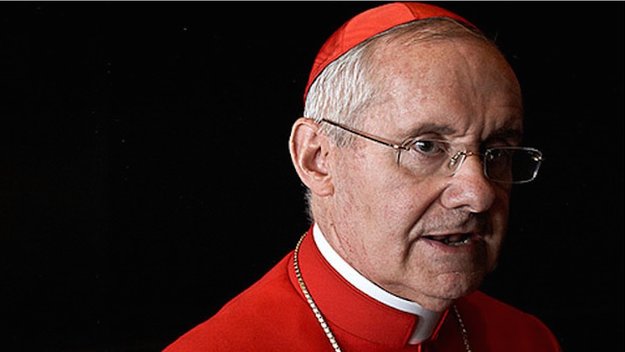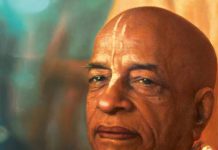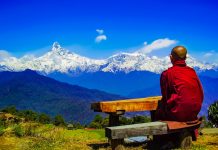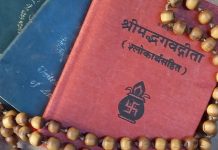 Cardinal Jean-Louis Tauran, President of the Pontifical Council for Interreligious Dialogue, drafted a message to Hindu communities world-wide on the occasion of Diwali, or Deepavali, the Hindu or Vedic New Year. Cardinal Tauran led the Catholic delegation to the first Hindu-Catholic Dialogue in the United States. Anuttama Dasa, ISKCON’s Minister of Communications represented ISKCON at that historic event.
Cardinal Jean-Louis Tauran, President of the Pontifical Council for Interreligious Dialogue, drafted a message to Hindu communities world-wide on the occasion of Diwali, or Deepavali, the Hindu or Vedic New Year. Cardinal Tauran led the Catholic delegation to the first Hindu-Catholic Dialogue in the United States. Anuttama Dasa, ISKCON’s Minister of Communications represented ISKCON at that historic event.
In his message, Cardinal Tauran highlights the Pope’s Encyclical Letter Laudato Si, wherein the Church calls for greater environmental awareness and action. Such a message is in solidarity with Vaishnava values, wherein we understand that everything within the universe is owned and controlled by God, and thus is meant to be engaged in His service. The Cardinal’s message, Christians and Hindus Promoting Human Ecology Together, is below:
Dear Hindu Friends,
- The Pontifical Council for Interreligious Dialogue sends you warm greetings as you celebrate Deepavali on 11 November 2015. May your celebrations across the glove lead you to and experience of happiness and harmony in your families and communities.
- His Holiness Pope Francis, in his Encyclical Letter Laudato Si, has recently addressed the environmental and human ecological crisis threatening our planet. Thus we deem it opportune to share, in keeping with our cherished tradition, some thoughts on the need to promote human ecology, and to foster a rediscovery of the interconnectedness of creation. Human ecology points to the relationship and responsibility, which humans have towards the earth and the cultivation of “ecological virtues.” These virtues include a sustainable use of the earth’s resources through adoption of policies, at national and international levels, which respect the interconnectedness and interdependence of human beings and nature. These issues, as we know, have a direct bearing not only on the current health of our earth – the home of the human family – but also for generations to come.
- Human selfishness, as evidenced in consumerist and hedonistic tendencies in some individuals and groups, nurtures an insatiable desire to be “masters” and “conquerors” rather than “guardians” and “stewards” of nature. We are all called, regardless of religious belief or national identity, to live with greater responsibility towards nature, to nurture life-giving relationships and, most of all, to reorder our lifestyles and economic structures according to the ecological challenges facing us. Your tradition stresses the “oneness” of nature, humanity and divine. The Christian faith teaches that the created world is God’s gift to all human beings. As stewards of the created order, we are called to care for it responsibly and resolutely.
- There is an inseparable link between our harmony with creation and our peace with one another. If peace is to prevail in the world, we must, together and as individuals, consciously give ourselves to “protecting nature, defending the poor, and building networks of respect and fraternity” (Laudato Si, 201). Promotion of human ecology requires formation and education, at all levels, in ecological consciousness and responsibility, and in the wise stewardship of the earth’s resources. This begins in the family, “the first and fundamental for ‘human ecology’… in which man receives his formative ideas about truth and goodness, and learns what it means to love and to be loves, and thus what it actually means to be a person” (John Paul II, Encyclical Letter Centesimus Annus, 39). Educational and governmental structures have a responsibility to form citizens in a proper understanding of human ecology and its relationship to the future of humanity and the created world.
- United by our humanity and mutual responsibility, as well as our shared values and convictions, may we Hindus and Christians, together with people of all religious traditions and good will, always foster a culture which promotes human ecology. In this way, there will be harmony within us, and in our relationships with others, with nature and with God, which will “favor the growth of the ‘tree of peace’” (Pope Benedict XIV, Message for the World Day of Peace, 2007). )
- Praying for a healthy ecology and creating awareness of the various ways to care for creation is a truly ennobling work. Pope Francis has instituted, therefore an annual ‘World Day of Prayer for the Care of Creation’ to be observed on 1 September. It is hoped that this initiative will increase awareness among all people of the need to be good stewards of creation and, thereby promote a true human ecology.
With these sentiments, we wish you all a joyous Deepavali!
Cardinal Jean-Louis Tauran, President
P. Miguel Angel Ayuso Guixot, MCCJ, Secretary










